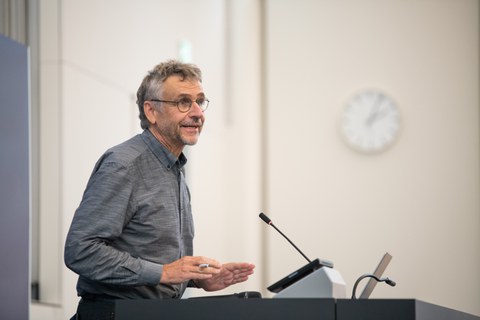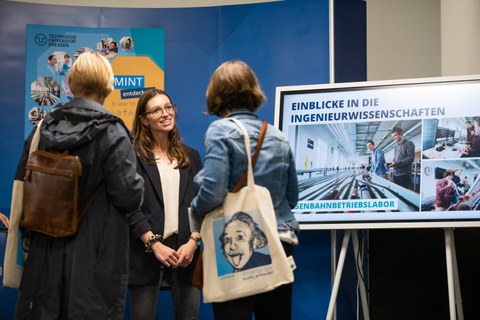Sep 10, 2024
Digital and STEM-friendly teaching – A contribution to securing skilled workers: TU Dresden celebrates dedicated schools
Author: Sebastian Sotero
The TUD Dresden University of Technology (TUD) today, September 10, 2024, honored nine schools from Saxony as "STEM-friendly schools" and eight as "digital schools" during a ceremony. This award from the nationwide initiative "MINT Zukunft schaffen" (Creating a STEM Future) recognizes the commitment of Saxon school administrators and teachers who are actively committed to modern and future-oriented school education in the fields of mathematics, computer science, natural sciences and technology (STEM).
Prof. Michael Kobel, Vice-Rector Academic Affairs at the TUD, expressed his appreciation during the welcoming speech and emphasized: "I would like to express my great respect and thanks to the award-winning schools. Behind the success of these schools are committed school administrators and teachers who, with creativity and a high level of time commitment, convey to their students a fascination for science and technology as well as relevant skills for the associated challenges of our time."
Wilfried Kühner, Head of Office of the State Minister of Education, Prof. Christoph Meinel, Chairman of the Board and Benjamin Gesing, Managing Director of MINT Zukunft e.V. ceremoniously presented the three-year certificates to the schools. The award is under the patronage of the Standing Conference of the Ministers of Education and Cultural Affairs (KMK) and the Federal Minister for Digital and Transport Affairs, Dr. Volker Wissing.
Awakening STEM enthusiasm in schools at an early stage
As a scientific institution, TUD actively promotes STEM education projects in order to secure young talent and counteract the shortage of skilled workers. This also includes its involvement as a founding member of the new "Network Energy Talents (NET)" initiative to promote young STEM talent. TU Dresden has been intensifying its cooperation with schools for several years, including the Dresden-Gorbitz grammar school, which has now received an award. TUD is just as active as a sponsor in national school networks as it is in setting up its own cooperation school network. TUD Vice-Rector Kobel continued: "As TU Dresden, we are happy to support these schools by making it possible for all age groups to experience current research directly in our laboratories and at school. In this way, we help to awaken enthusiasm and interest in STEM at an early age and maintain it throughout the school career. As a university, we would of course be delighted to attract pupils from STEM-friendly and digital schools to study STEM in this way and thus make our joint contribution to the demand for STEM specialists."
During the award ceremony, TU Dresden presented itself with information stands and presented offers for school classes, such as the school modules of the Cluster of Excellence Center for Tactile Internet with Human-in-the-Loop (CeTI) or the extensive portfolio of learning laboratories and workshops at the faculties.



